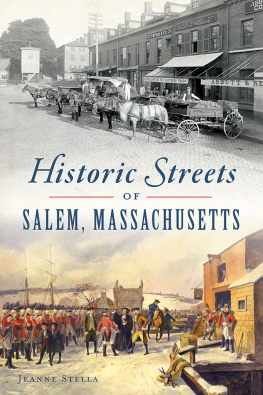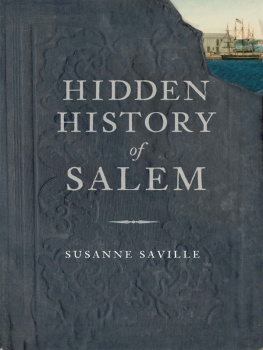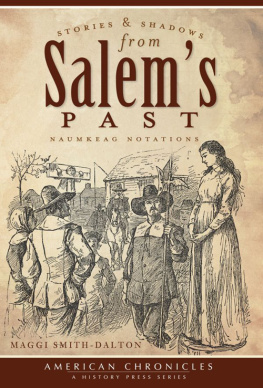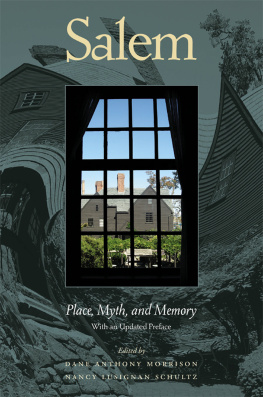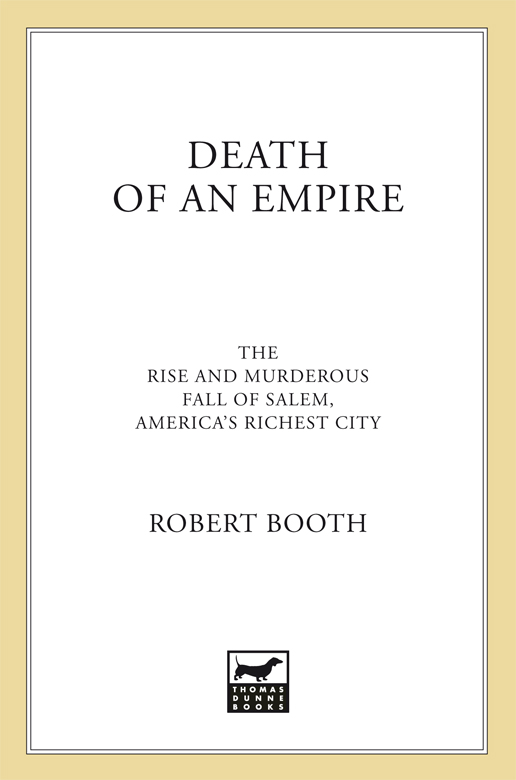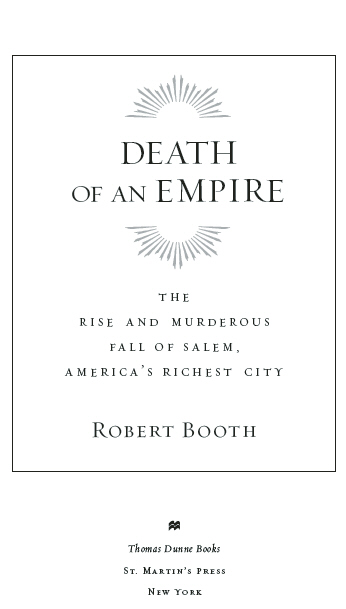
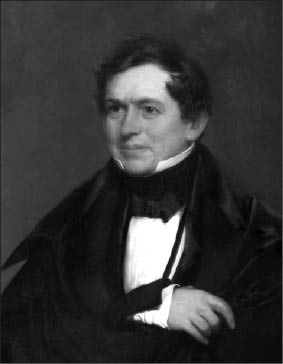
THE PRINCE OF SALEM . Salems foremost merchant and civic leader after the War of 18121815, the fabulously wealthy Stephen White (17871841) pursued his vision of both a world-class seaport and a modern city.
D EDICATED TO MY MOTHER,
J OYCE M C K AY B OOTH,
A LOVER OF HISTORY,
AND TO THE MEMORY OF MY FRIEND
J OHN P ICKERING J R. OF S ALEM
C ONTENTS
Lo! in the magic mirror I uphold,
thou seest thy ripening greatness; wide thy bounds
extend, temples and palaces arise,
arts flourish, and pomp of luxury
rolls through thy gorgeous streets. But in the heavens
behold the appalling sign! And on it writ
in characters of fireCarthage is not,
nor Tyre, nor Sidonand their fate is thine!
H ENRY P ICKERING OF S ALEM,
FROM HIS POEM T HE H UDSON, C. 1830
P REFACE
E. Hasket Derby, of Salem, Massachusetts, was Americas first millionaire. As a pioneer of his nations commerce with the Orient, he accumulated property on a scale so vast that at his death in 1799, he was the wealthiest man on earth; and to this day he remains one of the seventy-five richest people in human history, rated at $31.4 billion in adjusted net worth. Amid emperors, bankers, railroad tycoons, and oil barons, he is the only one whose business was shipping. And all of his shipping was done from the seaport of Salem.
Derby bequeathed an empire including two hundred wooden ships and favored positions in major markets from the Caribbean to the South China Sea. His successors were deeply grateful. Salem, the sixth-largest population center with about 9,500 inhabitants, was by far the richest place, per capita, in the United States; and so it stayed for another thirty years. In truth, it had few resources other than confidence, aggressiveness, and intelligence, but these were enough for its vessels to be the first to carry the flag into the seaports of India, Sumatra, Java, and Arabia and for its shipowners to remain the dominant Americans in those markets for many years.
Salems merchants, operating within the larger white male political system, ruled the town as autocrats, but also as sons of the Enlightenment. Their drive to prosper was matched by their scientific interests and their fascination with foreign cultures. Although their ships bristled with cannon, they established a worldwide commerce without resorting to coercion or violence toward other peoples. For decades, Salem was the center of American multicultural consciousness. In its streets were the goods and aromas of far-off places; at the heart of its downtown was the museum of another world. Salem was not like the rest of America.
Salems commerce with the peoples of the Indian Ocean was achieved without the arrogance and exploitation that were typical of Europeans. Salem men deplored the behavior of the British, French, and Dutch, and they and their government were not interested in overseas colonizing, nation-building, or imposition of values or politics on others. Americans were guests in the East. Since America produced nothing of any value to their hosts, most of Salems East India vessels sailed in ballast, with cavernously empty holds. This daunting lack of an outward cargocold cash was the only medium of exchange on boardwas both real and symbolic: Salem merchants relied on the resourcefulness of their agents to fill those huge spaces and did not presume to send unwanted exports, including notions of cultural or military superiority. When it became the fashion to dispatch American missionaries to the East, most Salem merchants actively opposed them. In foreign ports, Salem men dressed down, spoke the lingo, ate the chow, mixed with the crowd, and took pride in their republican ways, so different from the British and French. While selling and buying ashore in the great trading cities, most Salem captains and business agents roomed in the native neighborhoods and negotiated directly with the local suppliers. It turned out to be a very good formula for success.
The eastward empire of maritime commerce made rich men richer and filled the nations coffers with the duties of foreign trade. But a newly independent America also began pursuing a manifest destiny westward, throwing waves of settlers onto the frontier, killing the Indians along the ever-changing borders, expanding slaveholding agriculture into new states and territories. The western empire of internal conquest and development, with steamboats plying the rivers and cities springing up to consume and manufacture, eventually challenged the wealth and influence of the seaports. In the collision of the two imperial movements, one would be overwhelmed by the values and ambitions of the other, with profound consequences for the future of the United States.
This book focuses on a typical ambitious Salem family, the Whites, and what they tried to accomplish in the seaport, the nation, and the world. It is a story of people and power, and the evolution of America into a modern country, and who won and lost in the process. The Whites belonged to a class of immensely wealthy, well-educated, entrepreneurial, globally oriented merchants who would disappear from the scene in the years between the War of 1812 and the 1830s. In their heyday, they served in the federal and state governments at the highest levels, and they connected the new republic to the markets and cultures of other peoples.
What happened? Why have we heard about the lurid witchcraft trials but not about Salems golden empire? One answer is that it existed long ago and far away, out on foreign oceans, before the Civil War, before germ theory and railroads and telegraphs, in a period that has remained obscure except for the War of 1812. Another answer is that it ended abruptly and did not relate to what came after: a reorganization of society based on industrial capitalism, immigration, urbanization, and westering progress. Finally, there was a cover-up: Salemites suppressed the memory of their empires sordid demise, a trauma involving murder, executions, and disgrace. Their conspiracy succeeded: modern Salem has no memory of the Whites and their many achievements.
Once the tall ships left in the 1830s and 1840s, the seaport joined the ranks of midsized American manufacturing cities, and its leaders had its beautiful rivers and inner harbor filled in and covered over with buildings, tracks, roadbeds, and freight yards. Many of the people formerly involved in commerce moved away, and new people moved in, and the decades of legendary wealth and global seafaring came to seem like a dream, except for a few upscale old neighborhoods and a collection of dusty stuff that the sailors had brought home. Salem accepted its fate and remained obscure until recently, as the fascination of the witchcraft episode of 1692 has given the city a different sort of historical celebrity. That an American empire could have risen and fallen in Salem in the decades before 1830 seems improbable; but an empire did, and with some help and the passage of time, it has been forgotten.
This book is also the story of a new way of being in the world. At the height of its commerce, Salem did what had never been done in the history of western expansion: it sent out its seafarers in peace and friendship, seeking from others only mutual regard and a fair exchange of goods. The impact of their arrival in foreign seas was felt as a moral force, in stark contrast with bloody-minded explorers and the armies and navies of the Europeans East India monopoly companies. By the early 1790s, Salem shipmasters, welcome everywhere, had broken the hold of the Dutch and the British on the best markets of South Asia. Among peoples in the Orient, Salem was imagined to be its own nation, overflowing with genial inhabitants, grand vessels, and treasure chests full of silver and gold.


